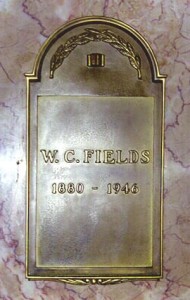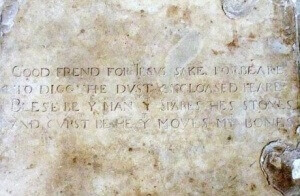Plan Your Epitaph Day
Depending on how you view it, a tombstone is your last chance to say goodbye, crack a joke, be profound, or otherwise make cemetery visitors imagine you were cool and wish they’d known you before they move on to visit their Nana’s weed-covered resting place.
Plan Your Epitaph Day was created by Lance Hardie in 1995 to coincide with the Day of the Dead (Dia de los Muertos), a Mexican holiday that honors the souls of departed loved ones. Hardie’s goal was simple: to make sure that we take control of our epitaphs, those few all-important words that will tell those who see them what we’d like them to think about who we used to be.
Playing with the idea of death is encouraged at this time of year. We dress up for Halloween and laugh, perhaps a bit timorously, at shadows. It’s also a time for reflection and mental housekeeping, as we’ve seen with holidays recently profiled here, such as Create a Great Funeral Day, Visit a Cemetery Day, and even National Magic Day, with its tribute to the death of Harry Houdini.
Let’s take a look at a couple of epitaphs quoted by Hardie.
W.C. Fields
Sadly, we must begin by debunking a favorite of ours: W.C. Fields did not have this on his gravestone:
“Here lies W. C. Fields. I would rather be living in Philadelphia.”
Fields was no fan of Philadelphia, famously calling it “a cemetery with lights.” When he was invited to contribute his own epitaph for the June 1925 issue of Vanity Fair, it was no surprise that Philly rated a mention. Since then, various permutations of the pithy comment have coalesced into a myth about his gravestone.
As it turns out, Fields didn’t use his headstone to take one last jab for posterity. (Perhaps he worried the joke would not stay fresh through the ages, or didn’t care since he wouldn’t be around to witness it?) Instead, it simply reads “W.C. Fields 1880 – 1946”.
William Shakespeare
Hardie also cites Shakespeare’s epitaph. This one does exist in the Collegiate Church of the Holy Trinity in Stratford-Upon-Avon, England. The gravestone is badly eroded and reads:
GOOD FREND FOR JESUS SAKE FORBEARE
TO DIGG THE DUST ENCLOASED HEARE
BLESE BE THE MAN THAT SPARES THES STONES
AND CURST BE HE THAT MOVES MY BONES
Shakespeare didn’t leave a spooky epitaph to be studied and interpreted in perpetuity. He left instructions. In his day, it was accepted practice to dig up bones from the church’s graveyard and tombs, moving them to make room for more burials. They were placed in a charnel house and subsequently burned.
(Some claim this was called the “bonefire of the vanities.” Although that would be a heck of an origin story for the title of Tom Wolfe’s book, we could find no proof of it.)
Shakespeare knew and disdained the church’s practice of recycling graves. He may have also meant to dissuade the government from moving his bones to Westminster Abbey. Thus far, his wishes have been honored.
A Sad Update
When we first wrote about him in 2015, Hardie was 79. He died the following year on October 27, 2016. It was surprisingly hard to find and verify this information, especially given the research capacity on today’s Internet. We had to triangulate his hometowns of Arcata and Eureka, CA, work history, and even his bequest to Humboldt State University to support future generations of students researching sustainable technology. We’ve been unable to find an obituary in any newspaper.
The saddest thing of all is that we haven’t found any record of the epitaph he wrote for himself, or a photo or description of his headstone. Sites like FindAGrave.com are dedicated to documenting grave markers worldwide. If you have this information, please contact us. It’s a shame not to know what Mr. Hardie chose to leave as his last words from beyond the grave.
What Now?
For anyone daunted by the prospect of writing their own epitaph, Mr. Hardie offered to write it for them. He didn’t provide prices, just noted it would be expensive. He did make exceptions for death row inmates and members of the U.S. military about to report to a war zone; he offered to write their epitaphs for free. (Death row inmates needed to provide the date of execution; service members, proof of their orders.)
We need to take a moment to point out that many who die in prison have no means to pay for their funerals and end up in prison graveyards like Captain Joe Byrd Cemetery in Texas, the largest in the country. They lie beneath markers that bear only name, inmate number, and date of death. Notorious killers are routinely identified by inmate number alone to discourage visitation and vandalism. Not much need for epitaphs there, free or otherwise.
In any case, Mr. Hardie is no longer available to take requests, and it doesn’t appear that anyone else has picked up his mantle. It could be an interesting career in an untapped market for those with a gift for writing a customer’s final soundbite. Food for thought.
For now, let’s get back to the fun stuff. A Google search for “funny epitaphs” returns thousands of results, including this one at BoredPanda. If you need some inspiration, use this epitaph generator at WikiHow. (Yes, WikiHow is still a thing.)
Here at Worldwide Weird Holidays, we want to get in on the fun and like to imagine the impact this would have in any cemetery at dusk:




 Today is National Author’s Day. In 1928, teacher Nellie Verne Burt McPherson suggested the creation of a holiday dedicated to American authors at a meeting of the Bement, Illinois, Women’s Club.
Today is National Author’s Day. In 1928, teacher Nellie Verne Burt McPherson suggested the creation of a holiday dedicated to American authors at a meeting of the Bement, Illinois, Women’s Club.
 No one could have predicted that Doctor Who would go on to be the longest-running science fiction television show in history. The original pilot was deemed unwatchable, scrapped and reshot, delaying the premiere by a week.
No one could have predicted that Doctor Who would go on to be the longest-running science fiction television show in history. The original pilot was deemed unwatchable, scrapped and reshot, delaying the premiere by a week.